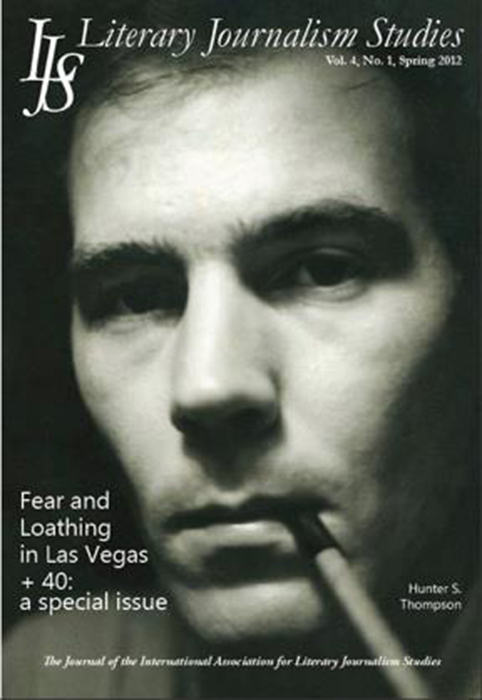Absolute truth is a very rare and dangerous commodity in the context of professional journalism.
Asked to give someone advice on what to do with his life, Hunter replied: “To presume to point a man to the right and ultimate goal – to point with a trembling finger in the RIGHT direction – is something only a fool would take upon himself.”
But since an answer was requested: “As I said, to put our faith in tangible goals would seem to be, at best, unwise. So we do not strive to be firemen, we do not strive to be bankers, nor policemen, nor doctors. WE STRIVE TO BE OURSEVES.”
For sure, a Gonzo journalist cannot be self-effacing. But then, only one person can really claim to have been a Gonzo journalist with success.
“Gonzo is all about exaggeration,” according to Doug Brinkley, the executor of the Hunter Thompson Estate and Professor of History at Rice University.
In Gonzo there is “the extreme personal involvement of the writer in the story itself” – said Warren Hinckle, founder of Scanlan’s Monthly.
In fact, “the writer becomes a character in his own story,” with the reader his sidekick, explains Craig Copetas, of Bloomberg News.
Brinkley’s, Hinckle’s, and Copetas’s comments are drawn from “Nothing Is Sacred” by Jonah Raskin.
In Keep THIS Quiet Too! Hunter is writing me at the time he begins Gonzo Journalism, and when he is crafting Fear and Loathing in Las Vegas. He is also setting up his Political Affairs Desk at the young Rolling Stone, which will result in Fear and Loathing: On the Campaign Trail. These letter jewels are in KTQ Too!
When I first met Hunter, Gonzo did not yet exist officially, though ever since Hunter Thompson’s birth it would exist, in potential, there in him, waiting for him to name it and give it shape His whole life was Gonzo from the get-go.
When I was the features editor for my high school newspaper and after that wrote for the Duke Chronicle, a journalist took for granted that a news story started with Who-What-When-Where-Why-How.
Not so with Gonzo, of course. Though Hell’s Angels was factual, the author on the sidelines, even then he drew himself into the story. Sure enough, at the end, he finished the manuscript. Then got stomped and added that incident in, not quite stopping the presses but close. Right at the end also you can read his iconic piece about riding his motorcycle at night, no speed limit, no visibility. On “The Edge.”
But his Gonzo style came out of the womb in 1970 in “The Kentucky Derby Is Decadent and Depraved”- which he plunged into, by accident: pure Gonzo, with no rewriting, with sheets torn from his notebook and sent to the printer. Reporting in a “be here now” mode – with no doctored, hindsight-scratched-out descriptions. Instead, unscripted. The reporter with his trusted tape recorder or whatever else got the words down fast enough. The finished product of a Gonzo work might include the notes, the Ed./HST portions, the faxes, everything untweaked.
If a writer aims at truth, catching the movement and the wriggling, transforming unexpectedness in the characters as it comes through his/her head and fingers in that moment when everything fits, then Hunter found it fresh – because undressed-up, still on the hook – under newly turned over stones. He always wanted to know what might be hiding, flushed out if startled, caught off guard, thrown out of a comfort zone.
This requires high concentration, keen alertness. And a story, an angle, a way in. Something that can hold the red-hot aim coming after it. In his case, later on, it also required good editing that “lashed the story together,” as he put it.
Hell’s Angels is proof that Hunter could be nail-sharp factually accurate. But his own voice was something else. Fortunately, for us, he chose to be himself.
In 1966, while Hunter was writing Hell’s Angels, Gay Talese wrote “Frank Sinatra Has a Cold,” an early example of New Journalism. Parallel to Hell’s Angels, Talese was including fictionlike descriptions in this Esquire piece. For him too, the story came about by accident. He coudn’t get an interview with Sinatra, which his assignment, just as – in writing about the champion skier Jean-Claude Killy a few years later – Hunter had trouble getting an interview with Killy, and that changed his story.
These years background Keep This Quiet! They are the A of the B point he jumped off from, or, as he himself said of Hell’s Angels in an interview, in publishing that book, he felt like he went through a door just before it closed – that reopened into Vegas.
Keep THIS Quiet Too! continues to follow Hunter, as he stayed very alive in my life in the 1970s in letters and by phone, in dreams and in memories.
I didn’t even mention in this short blog his fictitious fantasies about real people, though Hunter said he always tipped his hand to the reader when a tale was not literally true. And the over-the-top true experiences. All in a day’s work if it’s a way of being yourself. But there are other ways. All of them count, whatever they are.
